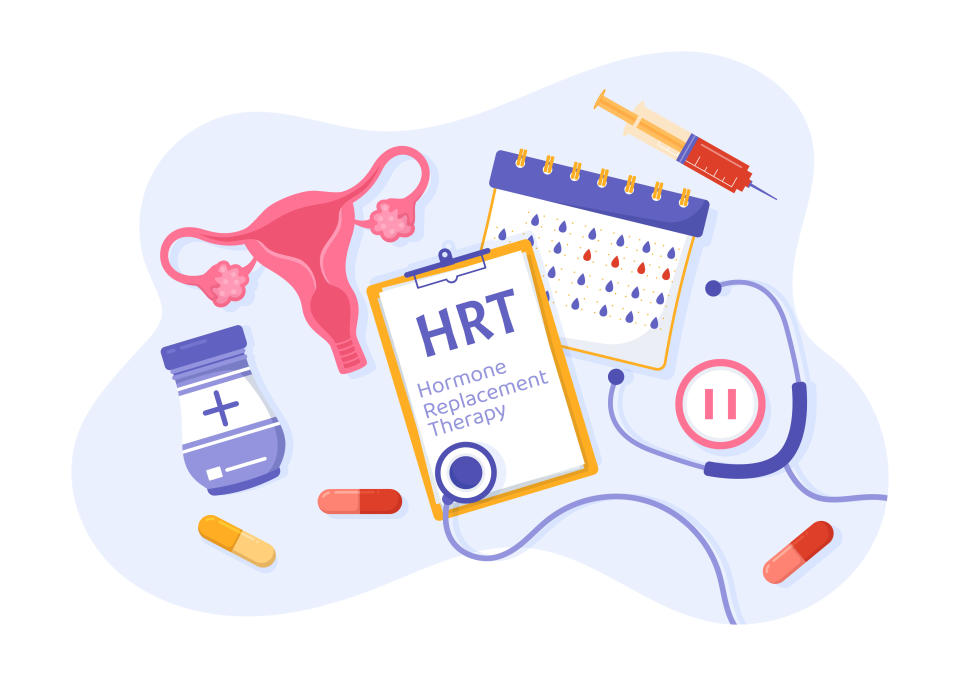This article is provided for informational purposes only and is not a substitute for professional medical advice, diagnosis or treatment. Contact a qualified health care professional before engaging in physical activity or changing your diet, medications, or lifestyle.


From hot flashes to mood changes, many disruptive symptoms of menopause are commonly associated with this time in a woman’s life. But when it comes to the health risks of menopause, especially for women who experience menopause earlier than usual, what’s the first thing to think about?
A recent study from the University of Oulu and Oulu University Hospital in Finland indicates that there are “serious” health risks for women who go through menopause before the age of 40, which This is called premature menopause. According to the study, patients who experienced premature menopause are at significantly higher risk of premature death, particularly from heart disease or cancer.
The researchers compared the health records of 5,800 women diagnosed with premature ovarian failure (POI) with the records of 23,000 women who entered menopause at a standard age, or approximately 51 years in Canada. According to the study, women with POI are twice as likely to die from heart disease and four times more likely to die from any type of cancer.
Talk with Yahoo Canada, a Calgary expert is urging women to be aware that they may be entering menopause at an earlier age and to avoid ignoring symptoms. Read on to learn more about the health risks associated with premature and early menopause.


What is the difference between premature and early menopause?
Dr. Shafeena Premji, board member of the Canadian Menopause Society, explains that there are often misconceptions when people describe menopause. She clarifies that premature menopause is the term used when a patient enters this phase before the age of 40. However, early menopause occurs when a person experiences symptoms between the ages of 40 and 45.
According to the Cleveland Clinic, premature and early menopause are quite rare. Early menopause occurs in about 5 percent of women, while premature menopause occurs in about 1 percent of patients. Additionally, premature menopause is very rare among people in their 20s, affecting only about 0.1 percent of patients.
“Women experiencing premature or early menopause are treated the same when it comes to the long-term consequences of early menopause,” shares Premji, owner of Milestone Menopause Center of Southern Albert in Calgary. “But they must be defined, because the younger the age, the longer the risk.”
How does premature or early menopause start?
Typically, menopause begins around age 51. According to Mount Sinai Hospital in Toronto, by age 55 or 56, more than 90 percent of women are menopausal. For premature or early menopause, these phases can sometimes begin spontaneously without explanation, according to Premji.
“Other times it may be due to surgery,” she adds. “So if you’re having both of your ovaries surgically removed, either for cancer or endometriosis, or if you’ve had chemotherapy or radiation for another malignancy.
“There are also certain genetic conditions that can also cause this. So for postmenopausal women under 30, we recommend genetic testing and karyotyping.”


What are the health risks associated with premature and early menopause?
Whether premature or early menopause, there are several potential long-term consequences. These include:
-
Early onset of cardiovascular disease
-
Earlier onset of premature mortality
-
Increased risk of dementia
-
Increased risk of osteoporosis
-
Increased risk of genitourinary syndrome of menopause (GSM)
The most important health risks people should be aware of are those related to the cardiovascular system. Premji explains that this is because estrogen helps protect the heart, meaning that if you enter menopause at an earlier age, it can have “adverse effects” on this part of your body.
“We know that mid-menopausal women become more resistant to insulin, leading to a higher risk of diabetes,” she adds. “So there are other comorbidities that also increase as you enter menopause.”
In Canada, cardiovascular diseases are the priority. 1 killer among women: “Many women worry about breast cancer as a cause of death, but we actually know that strokes and heart attacks are the leading cause of death among women,” shares Premji. “When a woman goes into menopause prematurely or early and she thinks, ‘Oh, I don’t have a period anymore, I don’t have to worry about pads or tampons,’ a lot of women think that this is nothing they need to take to their family doctor.”


What should you do if you are experiencing premature or early menopause?
Premji, who also sits on the Canadian Menopause Foundation’s medical advisory board, notes that she sees women ignoring their symptoms “all the time” in her office. She adds that it’s important for patients to be aware and advocate for their own health, even though experts say they might be too young for something like menopause.
“If they don’t, they’re going to miss this window of opportunity to start hormone (replacement) therapy, which is going to protect them on many levels in terms of their overall health, including their risk of cardiovascular disease ” she said. Remarks. “I very often see patients in my office who say to me: ‘My doctor told me it’s too early, I can’t be in menopause,’ and who simply brush off their symptoms.”
In one example, she says that if a woman is under 45 and hasn’t had her period in four months, it’s “not normal” and she should have a complete checkup with blood tests. Furthermore, she adds that it is important to detect these problems as early as possible, otherwise patients risk missing periods of treatment where they could benefit greatly: “The longer the delay, the more likely you are to develop these consequences later. long term. “.


Premji says that worldwide, menopause organizations recommend hormone replacement therapy (HRT) for premature and early menopause. According to a 2023 study published in the Canadian Medical Association Journal, hormone therapy should be the first treatment offered to women under 60 who are suffering from menopausal symptoms.
“All women under the age of 45 who enter menopause should be offered and advised to undergo hormone replacement therapy until the age of 51, which is the average age of menopause,” notes Premji .
What resources are available regarding premature and early menopause?
One of the resources Premji recommends includes the International Premature Ovarian Failure Registry, or POI Registry, based in the United Kingdom. This database allows people diagnosed with POI to register and help improve research related to premature menopause.
Premji also says the Australian site AskEM is “a very good patient advocacy website”, where people can access more information about early menopause.
Let us know what you think by commenting below and tweeting @YahooStyleCA! follow us on Twitter And Instagram.